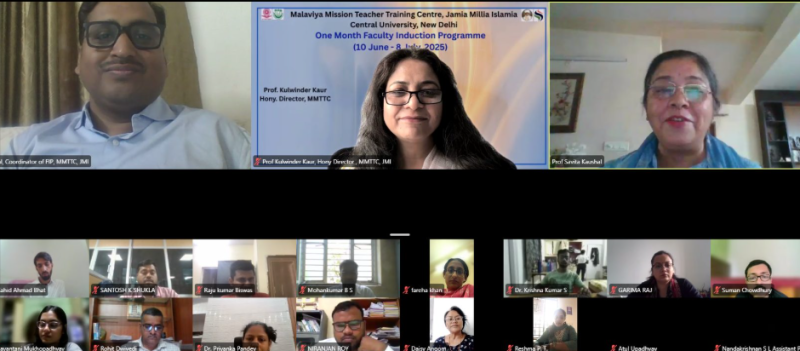The Malaviya Mission Teacher Training Centre (MMTTC), Jamia Millia Islamia (JMI) successfully concluded its 19th Online One-Month Faculty Induction Programme (FIP) held from 10th June to 8th July 2025. The programme was designed as per Gurudakshta guidelines to equip newly appointed faculty members with essential pedagogical, ethical, and professional competencies aligned with the vision of the National Education Policy (NEP) 2020.
Aimed at fostering a holistic understanding of higher education and nurturing reflective teaching professionals, the FIP featured 96 expert sessions delivered by distinguished scholars, academic leaders, and policymakers from across the country.
The programme attracted 181 early-career faculty members from diverse disciplines, representing both public and private institutions of higher education. The programme was skilfully coordinated by Prof. Savita Kaushal (Professor) and Dr. Dori Lal (Associate Professor), IASE, Department of Teacher Training and Non-Formal Education, JMI, under the leadership of Prof. Kulwinder Kaur, Honorary Director, MMTTC-JMI, with support from a dedicated academic and administrative team.
Eminent experts and resource persons from varied institutions across India—including Central Universities such as Jamia Millia Islamia, Jawaharlal Nehru University (JNU), University of Delhi (DU), Aligarh Muslim University (AMU), Banaras Hindu University (BHU), Central University of South Bihar (CUSB), Central University of Haryana (CUH), Central University of Kerala (CUK), Mizoram University, and Guru Ghasidas Vishwavidyalaya; National Institutions such as NCERT, NIEPA, IGNOU, and IITs; and state and specialized universities such as Vinoba Bhave University delivered enriching lectures on higher education policies and ecosystem, curriculum design, ethics and integrity in research, technology-enabled learning, student engagement, sustainable development Goals (SDGs), and professional development. This month-long academic discourse integrated perspectives from policy, practice, and pedagogy.
The inaugural session set the tone for the programme with insightful talks by Prof. Furqan Qamar on Strategic Planning and Management, and Prof. Pranav Kumar on Linkages with Constitutional Values and SDGs. Eminent speakers such as Prof. S.P. Malhotra, Prof. Indrani Bhaduri (NCERT), and Prof. Ramesh C. Sharma (AUD) addressed critical issues such as innovative assessments, higher education reforms, and digital pedagogies.
Sessions by experienced professionals—including Prof. V.P. Yadav (former Chairman, BSEH), Prof. Jessy Abraham (Dean, Faculty of Education, JMI), Prof. Anjum Sibia (NCERT), and Prof. C.B. Sharma (VC, Vinoba Bhave University)—offered a rich blend of theory and practical insight. Skill-based workshops were conducted on intellectual property rights, cyber security, blended learning, MOOCs, and instructional design, enhancing participants’ professional capabilities.
Recognizing the multidisciplinary nature of higher education, the programme also explored intersections of education with law, public health, gender equity, environment, tourism, and space innovation. Senior administrators from UGC, NCERT, NIEPA, and the Ministry of Education shared valuable institutional and regulatory perspectives. Sessions on emotional intelligence, wellness, work-life balance, and teacher leadership focused on academic stress management, mentoring, life skills, and counselling. A special session was conducted by Dr. Ganesh Shankar Giri, Sagar University, on Yoga for Holistic Health on 21st June to commemorate the International Yoga Day, reflecting India’s commitment to well-being of all.
The final week of the programme featured theme-based presentations by participants to showcase the ways in which they would integrate the learnings from FIP into their discipline-specific teaching practices. An online MCQ test was conducted by the coordinators for evaluation and grading purposes as per the programme guidelines. The final day of the programme featured thought provoking sessions by eminent experts who reflected on the transformative role of faculty in the evolving higher education ecosystem. Prof. S. K. Panda (Former Chairman, NCTE & Former Director, STRIDE, IGNOU) delivered an insightful lecture on National Credit Framework-2023, curricular reforms while emphasizing the need for competency-based, multidisciplinary education aligned with NEP-2020. Prof. N. V. Varghese (Distinguished Visiting Professor, IIT Bombay) spoke on Research in Higher Education, highlighting global trends, policy frameworks, and the critical role of faculty in creating a research-enabling environment.
The last session was marked by an impactful valedictory address by Shri Anandrao V. Patil, Additional Secretary (PMPY & Digital Education Bureau), Ministry of Education, Government of India, on the role of teachers in nation building through inclusive and value-based education. He shared insights into the key policy initiatives and various online educational reforms being driven under the NEP 2020 framework. In the second part of the session, Prof Kulwinder Kaur invited feedback and suggestions from the participants to enrich future endeavours by MMTTC, JMI. The participants were immensely appreciative of the overall design of the programme, its co-ordinators, the resource persons, the Director and her team. Thereafter, Prof Kaushal, Dr Dori Lal, and Prof Kaur thanked the participants for their valuable feedback and motivated them to become not just future ready educators but responsible mentors of their students. The programme concluded with the formal vote of thanks by Dr Shahla Tarannum on behalf of MMTTC team.


